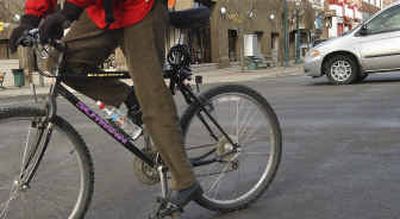Bills clarify traffic rules for bicyclists, pedestrians and autos

BOISE – North Idaho’s newest senator wants to make sure bicyclists stop at red lights, rather than just “zipping through.”
“I don’t think zipping through a red light is safe,” said Sen. Joyce Broadsword, R-Sagle. “You might have experienced riders who could do it no problem, but you might have inexperienced riders who could be hurt.”
Broadsword has proposed three bills dealing with bicycles and pedestrians, and one cleared the Senate Transportation Committee on Tuesday while the same panel agreed to introduce the other two.
One bicyclist who showed up at the committee hearing said the red-light change, which requires bicyclists to stop until the light turns green, has a flaw: If a bicyclist gets to a red light that’s triggered by a sensor, it might never change. That’s why current law allows bicyclists to stop, and then proceed, he said.
The current law “says you have to stop, it doesn’t say you have to remain stopped,” said Dwight Tovey of Meridian, a League of American Bicyclists certified instructor. “It’s going to be a big problem.”
Broadsword said all three bills came from a group of law enforcement and safety officials. “There are five proposed bills – I’ve got three of ‘em,” she said.
The officials gave the proposals to Sen. Shawn Keough, R-Sandpoint, and Keough shared some with Broadsword to allow the new senator to “get my feet wet,” Broadsword said.
Capt. Ben Wolfinger of the Kootenai County Sheriff’s Department joined Broadsword to present the bills Tuesday. Wolfinger said some current laws dealing with bicycles and pedestrians are unclear. That’s made it hard to prosecute bicyclists for running red lights, and it’s also made it hard to prosecute drivers who fail to yield properly to pedestrians in crosswalks.
“We all sat down and agreed on some general language, and I formatted it,” Wolfinger said before the meeting. “I think it’s going to make it safer for everybody. I think that’s our role.”
However, after talking with Tovey and others after the committee hearing, Wolfinger said he’ll look into an additional change to deal with bicyclists stuck at non-responsive, sensor-operated lights. That’s a problem for motorcyclists, too, he said.
“That’s a great follow-up to it. We’ll take a look at it,” Wolfinger said.
The first of the three bills, SB 1011, changes a code reference, just changing a 7 to an 8. It’s a law that says bicyclists, just like motorists, must comply with the provisions of two chapters. The current law says they must comply with chapters 6, which deals with turns and turn signals; and 7, which deals with bicycles and pedestrians. Chapter 8 is the section on stop lights and stop signs.
“I thought it was just a typo and it wouldn’t generate a lot of interest,” Broadsword said.
But the measure raised some concerns. “There have been some who have talked to me who are bicycle riders, who feel it’s some sort of a restriction on their ability to ride their bike,” said Sen. John McGee, R-Caldwell.
Wolfinger assured the senators, “It’s just a clarification.”
The second bill says bicyclists can turn right, or turn left onto a one-way street, after stopping at a red light, without having to wait until it turns green.
The third bill clarifies when cars have to yield to pedestrians in crosswalks. Wolfinger said that’s been a problem in Sandpoint, where there was a rash of vehicle-pedestrian accidents in 2004. Under the proposed new law, drivers must yield when the walker is a lane away from them, but not if the pedestrian is clear on the other side of the street.
“This actually came out of the city of Sandpoint – it was a case they had,” Wolfinger told the Senate panel. “The courts held that basically, if they hadn’t struck a pedestrian, they’d yielded to them.” Amid stunned laughter from the senators, Wolfinger said, “The code was very unclear as to where you have to yield. This gives some clarity.”
Broadsword said she was happy to sponsor the bills in the interest of safety.
On the red-light change, she said, “It’s so that they don’t buzz through a red light and get hurt, by making it necessary for them to stop. I feel that we are protecting the safety of not only the bicyclist, but the motorist who would be about to hit them in an accident.”
While SB 1011 now goes to the full Senate for a vote, the other two bills will return to the Senate Transportation Committee for a full public hearing. Said Keough, “We’ll probably have a lively hearing.”